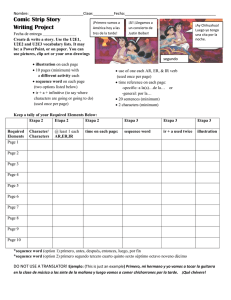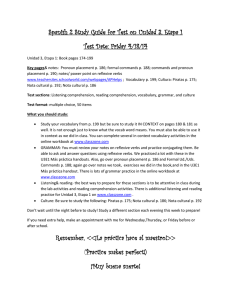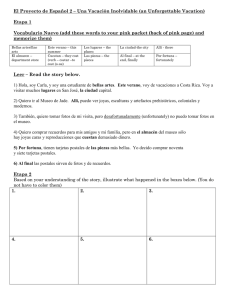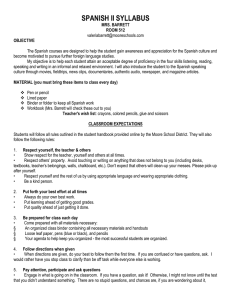Spanish 1-2 Curriculum Map
advertisement
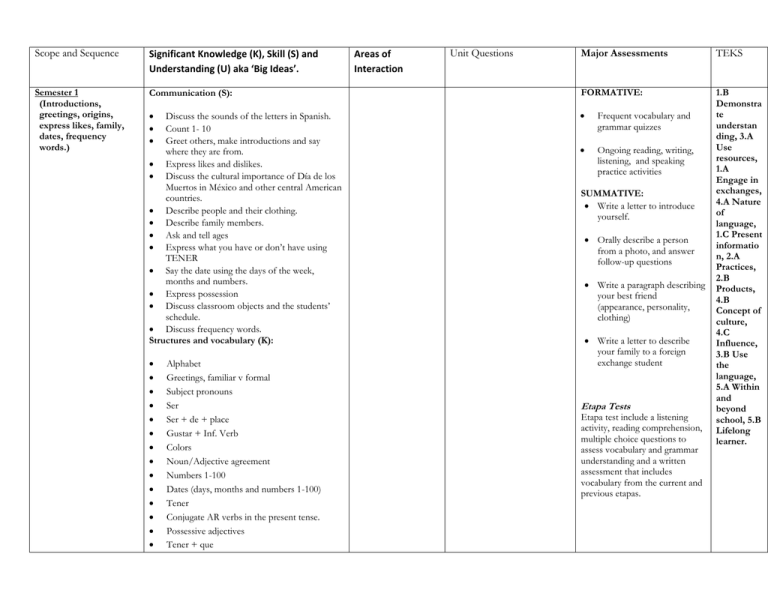
Scope and Sequence Significant Knowledge (K), Skill (S) and Understanding (U) aka ‘Big Ideas’. Major Assessments TEKS Semester 1 (Introductions, greetings, origins, express likes, family, dates, frequency words.) Communication (S): FORMATIVE: Frequent vocabulary and grammar quizzes Ongoing reading, writing, listening, and speaking practice activities 1.B Demonstra te understan ding, 3.A Use resources, 1.A Engage in exchanges, 4.A Nature of language, 1.C Present informatio n, 2.A Practices, 2.B Products, 4.B Concept of culture, 4.C Influence, 3.B Use the language, 5.A Within and beyond school, 5.B Lifelong learner. Discuss the sounds of the letters in Spanish. Count 1- 10 Greet others, make introductions and say where they are from. Express likes and dislikes. Discuss the cultural importance of Día de los Muertos in México and other central American countries. Describe people and their clothing. Describe family members. Ask and tell ages Express what you have or don’t have using TENER Say the date using the days of the week, months and numbers. Express possession Discuss classroom objects and the students’ schedule. Discuss frequency words. Structures and vocabulary (K): Alphabet Greetings, familiar v formal Subject pronouns Ser Ser + de + place Gustar + Inf. Verb Colors Noun/Adjective agreement Numbers 1-100 Dates (days, months and numbers 1-100) Tener Conjugate AR verbs in the present tense. Possessive adjectives Tener + que Areas of Interaction Unit Questions SUMMATIVE: Write a letter to introduce yourself. Orally describe a person from a photo, and answer follow-up questions Write a paragraph describing your best friend (appearance, personality, clothing) Write a letter to describe your family to a foreign exchange student Etapa Tests Etapa test include a listening activity, reading comprehension, multiple choice questions to assess vocabulary and grammar understanding and a written assessment that includes vocabulary from the current and previous etapas. Learning about where Spanish is spoken and the basic geography of the Spanish-speaking world. Semester 2: Communication (S): FORMATIVE: Time & schedules; leisure activities; likes and dislikes; expressing emotions; talking on the phone; sports; making comparisons. Frequent vocabulary and grammar quizzes Ongoing reading, writing, listening, and speaking practice activities Talk about schedules, ask and tell time. Ask questions using interrogative words. Say where someone is going using the verb IR Use the verb ESTAR to talk about location Talk about plans and sequence events. Discuss places and people that you know using the verb CONOCER Say what you are going to do, using IR + a + infinitive Invite others to events Express feelings and emotions Talk about where you are coming from. Discuss what just happened Discuss sports and sports equipment Talk about preferences Express what you know using SABER Make comparisons Structures and vocabulary (K): Telling time Interrogative words. Venir Ir and Ir + a + inf. Verb Present tense regular ER and IR verbs. Estar, location v feelings Sequence words. Acabar + de Irregualr YO forms: conocer, hacer, oir Personal “a” Stem-changing verbs EIE, UUE Irregular “boot” verbs. Comparative words. SUMMATIVE Write a typical schedule for a week of school, including subjects studied, times classes meet, lunch, and extracurricular activities Orally describe a photo of a school setting, and answer follow-up questions Phone conversation, including discussion of plans and an invitation Write an advertisement to an event, including activities, schedule, and food Etapa Tests Etapa tests include a listening activity, reading comprehension, multiple choice questions to assess vocabulary and grammar understanding and a written assessment that includes vocabulary from the current and previous etapas. 2.A Practices, 2.B Products, 4.B Concept of culture, 1.B Demonstra te understan ding, 3.A Use resources, 1.A Engage in exchanges, 1.C Present informatio n, 4.A Nature of language, 4.C Influence, 3.B Use the language, 5.A Within and beyond the school, 5.B Lifelong learner








